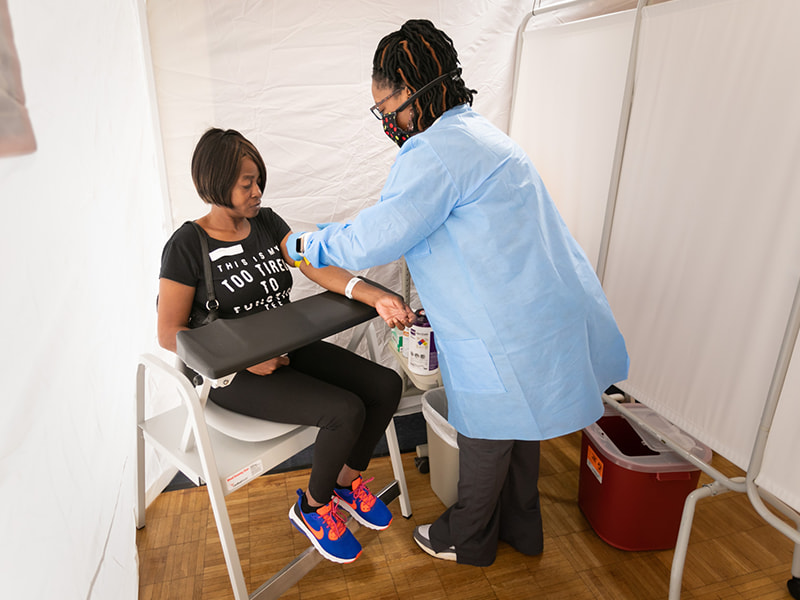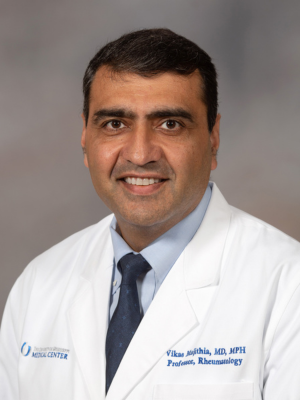Those at higher COVID-19 complication risk should note these tips

Patients who live with chronic diseases or a compromised immune system need to carefully follow tactics to prevent exposure to COVID-19, the novel coronavirus, say University of Mississippi Medical Center physicians.
Prevention is especially important for those with heart disease, hypertension and diabetes. Statistics from the Mississippi State Department of Health show many who died of COVID-19 have one of those three underlying conditions.
Others with pre-exisiting conditions who have with higher rates of death from COVID-19 include people with obesity, lung disease, renal disease, liver disease and suppressed immune systems due to illness or treatment, such as arthritis, lupus or cancer.

“This virus is especially risky for individuals with many common chronic conditions,” said Dr. Javed Butler, Chairman of the Department of Medicine. “We urge such individuals to do all they can to avoid exposure to patients with known or suspected COVID-19, and continue with hand hygiene and social distancing.
“Currently, avoiding the virus is the best defense against it,” he said.
Recommendations on how to avoid it are the same as for everyone regardless of current health status with primary points including: stay home, avoid crowds; wash your hands; and disinfect surfaces you frequently touch.
Here’s a breakdown
Heart or cardiovascular disease
Dr. Michael McMullan, director of the Division of Cardiovascular Diseases, points to notices from the Centers for Disease Control and the American College of Cardiology that say the COVID-19 poses a double threat for some heart and cardiovascular patients: Many are at increased risk of getting COVID-19 and if they do have it, they are at increased risk of it developing into a serious illness.

“While they don’t specify which groups are at highest risk, those with heart failure and those patients with heart transplants on immunosuppressive therapy would likely be the most concerning groups,” he said.
Nationally, doctors say COVID-19, even in those who previously had no heart or cardiovascular conditions, may cause myocarditis or acute weakening of the heart muscle. Either could lead to heart failure, shock and/or life-threatening arrhythmias, McMullan said. Some COVID-19 patients also may have a heart attack that unrelated to atherosclerotic occlusion like a typical heart attack, he said.
COVID-19 symptoms also may include severe chest tightness or shortness of breath, he said.
UMMC physicians are encouraging any heart patients to be vigilant in following recommendations to reduce exposure to COVID-19, he said.
Diabetes
Diabetes can be difficult to manage in normal situations, and the COVID-19 pandemic makes everyday life far from normal, said Dr. Lillian Lien, professor of medicine and director of the Division of Endocrinology, Metabolism and Diabetes.

“Diabetes puts a person at great risk for infection and also means that, once infected, that patient is likely to have more severe symptoms, and end up sicker and for longer than a person without diabetes,” she said. “This is why it’s so important to avoid crowds and stay home and follow all the tactics listed below.”
“Now it is even more important for people with diabetes to check their blood sugars and keep the numbers under control,” she said.
Lung disease

“We are telling all patients with lung disease to shelter at home,” said Dr. John Spurzem, professor of medicine and director of the Division of Pulmonology.
Currently, science doesn’t clearly show which lung diseases have the most risk from COVID-19 disease.
“We presume that most do have increased risk for severe disease,” Spurzem said.
Early data from China and Italy show that smokers are at risk for more severe disease. State Health Department records show those with lung disease have higher rates of death from the disease than those with no chronic medical conditions
UMMC pulmonology currently is communicating with most of its cystic fibrosis patients and urges any with new fever or an abrupt change in symptoms to call. Many would be sent for testing, he said.
Division staff also are referring cystic fibrosis patients to the Cystic Fibrosis Foundation website for regularly updated information.
Autoimmune diseases
Patients with autoimmune diseases such as rheumatoid arthritis, lupus, vasculitis and others are at high risk, said Vikas Majithia, professor of medicine and director of the Division of Rheumatology.

“This is especially true if the patients are being treated with immunosuppressive agents and/or biologics,” he said.
Patients on medication should make no changes without talking to their rheumatologist or staff, he said, urging them to call about issues with medication, if their condition worsens or if they have questions.
“If they’ve been exposed to COVID-19, they may have to stop their treatment but should call their doctor first,” he said. “This may require a telehealth/office visit.”
Those having the classic symptoms of COVID-19 need to call the hotline, he said.
Cancer
Many cancer therapies can deplete white blood cells, the body’s defense system, leaving patients in treatment more vulnerable to disease. This is especially true for those receiving chemotherapy and bone marrow transplant therapies. It can apply to cancer survivors too. Some may have healthy immune systems and others may not.

“Cancer patients who are on active therapy or who have active disease but are not on current therapy all need to treat themselves as ‘high risk,’ irrespective of their age,” said Dr. John Ruckdeschel, Cancer Center and Research Institute director. “This means maximal attention to social distancing (essentially full quarantine), hand washing and maintain a healthy lifestyle within those constraints.”
Cancer survivors who are at least a year out from therapy should follow age-related guidelines, he said.
The COVID-19 advice isn’t new to cancer patients in treatment.
“We always advise patients receiving cancer therapies to take these precautions,” said Sheila Clincy, nurse manager of the CCRI outpatient oncology clinic at Jackson Medical Mall.
“With the arrival of Covid19, it becomes even more important.”
COVID-19 precautions include:
- Stay home.
- Ask friends and relatives to visit through virtual apps such as Facetime, Skype or Zoom.
- Wash your hands. Use soap and water and wash for 20 seconds. Wash often. Sing “Happy Birthday” twice. (or Happy Health Day to me).
- Use hand sanitizer if you cannot wash your hands.
- Avoid touching your face, mouth, eyes or nose with unwashed hands.
- Avoid crowds. Use a mask, a homemade one or one given you by your health provider, when you do have to go out, even to doctor’s appointments. Ask a friend to do necessary shopping for you, use delivery, or pick up services.
- Use disinfectant wipes on surfaces in your home and auto that you frequently touch. Think of your phone, handrails, door knobs, remote controls, keyboard, and other such items.
- Eat a healthy, balanced diet and exercise.
- Call your doctor if you exhibit symptoms of the COVID-19 virus. Symptoms include fever, cough, sore throat or shortness of breath.
Other groups at high risk include those who have had solid organ transplants and who take medication to avoid organ rejection, the obese and the elderly, especially those 70 and older.


